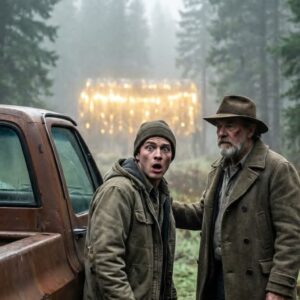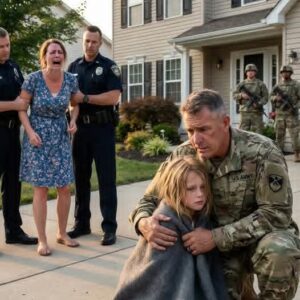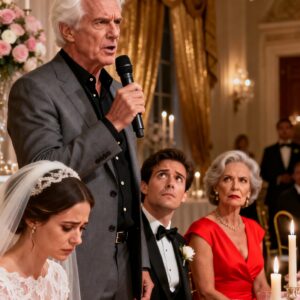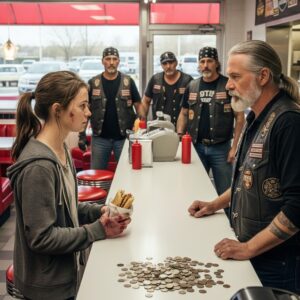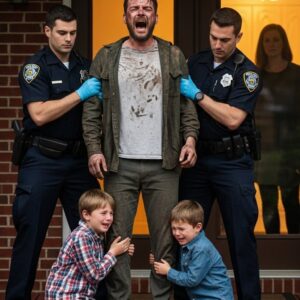(A mother’s revenge that began with a broken leg and ended with freedom.)
The Arizona sun didn’t just shine — it punished.
By noon, it felt like the desert itself was alive, pressing down with waves of heat so thick that even breathing became labor.
Isabella Moreau wiped the sweat from her brow and looked over her shoulder. Her daughter, Sophie, was struggling to keep up. The fifteen-year-old’s face was pale beneath her sunhat, her lips trembling.
“Come on, Sophie!” called Mark — Isabella’s husband — from up ahead, his tone sharp and impatient. “It’s just a hike! You’ll survive.”
Isabella’s heart tightened. She wanted to say something — to defend her daughter — but she’d done that before. And every time she did, Mark’s jaw would tighten, his eyes would roll, and the family would exchange that knowing look that said: There she goes again, making excuses.
Sophie stumbled, catching herself on a rock. The sound that escaped her throat was small, strangled — half pain, half apology.
Clara, Mark’s sister, was walking with her teenage sons, both of whom were scrolling through their phones even out there, on the trail. She laughed and said loudly, “Oh, for God’s sake, Isa, she’s fine! You’ve babied her too much. Kids today can’t handle anything!”
Isabella’s hand curled into a fist. She forced a smile. “She’s not fine, Clara.”
But Clara shrugged. “She’s dramatic. Like her mother.”
The words stung more than the heat. Isabella turned back to Sophie, who was now limping, her right leg barely touching the ground. “Sweetheart,” she said softly, crouching down. “Where does it hurt?”
“My leg,” Sophie whispered. “It—snapped. I heard it.”
For a moment, the desert went silent.
Mark walked back toward them, his face unreadable. He looked at Sophie’s trembling hands, at her tear-streaked face, and then — unbelievably — he laughed. “If it was broken, she wouldn’t be able to walk at all. Stop encouraging her, Isa.”
That word. Encouraging. As if empathy was a crime.
Mark turned and kept walking. The others followed. And Isabella — heart in her throat — lifted her daughter to her feet and helped her limp forward, step by excruciating step.
For three hours, they walked. Three hours of heat and shame and silent tears. Sophie’s breath came in shallow gasps, her skin gone the color of chalk. Every few minutes she’d whisper, “I’m okay,” just to stop her mother’s tears.
When they finally reached the parking lot, the girl collapsed. Not fainted — collapsed. Her leg twisted at an angle no leg should twist.
Clara sighed. “Oh come on, Isa. She’s milking it.”
But Isabella had already dropped to her knees, her fingers trembling. The sight of that leg made bile rise in her throat.
The X-Ray That Changed Everything
At urgent care, the fluorescent lights hummed. The smell of antiseptic burned her nose. Sophie lay still as the nurse slid the X-ray plate beneath her leg. Isabella held her hand, whispering prayers under her breath.
When the doctor entered, holding the film up to the light, Isabella’s heart stopped.
A spiral fracture. The tibia snapped clean through.
“Multiple microfractures,” the doctor said. “She must have been walking on this for hours.”
Isabella turned to Mark. His face drained of color. “I didn’t think—” he began.
But Isabella wasn’t listening. She was looking at her daughter — her brave, sensitive, unapologetically fragile child — sleeping under sedation, her leg bound in plaster.
Clara muttered something about “overreacting.” Mark told the doctor they’d “just made a mistake.”
That was the last straw.
Something broke inside Isabella that night. But unlike Sophie’s bone, it didn’t heal wrong — it healed stronger.
The Escape
She didn’t yell. Didn’t throw things. Didn’t even argue.
That night, while Sophie slept in her hospital bed, Isabella quietly booked two one-way tickets to Boston. The city she’d fled fifteen years ago to marry Mark — a man who’d once been gentle and patient, before ego turned him into someone else.
At 5 a.m., she signed the discharge papers herself. Sophie was still groggy, her cast heavy, her voice small. “Mom… are we in trouble?”
“No, honey,” Isabella said, pushing her wheelchair toward the sliding glass doors. “We’re going home.”
The cab driver looked at them — the weary mother and the girl with the broken leg — and said nothing. Outside, the desert sunrise bled across the horizon like fire.
By the time Mark woke, they were already airborne. His calls went unanswered. His texts unread.
Starting Over
Boston greeted them with rain — the kind that smelled like clean slates. Isabella’s old friend, Elena, met them at the terminal, her umbrella tilting sideways in the wind.
When she saw Sophie’s leg, her mouth fell open. “Isa, what happened?”
Isabella told her everything — the hike, the laughter, the X-ray, the silence. When she finished, Elena’s hands were shaking around her coffee cup.
“That’s abuse,” she said flatly.
The word hit Isabella like a truth she’d known all along. Abuse wasn’t just fists. It was mockery. Neglect. Indifference disguised as “tough love.”
Over the next few weeks, Isabella rebuilt piece by piece. She found work at a small marketing agency. Sophie started therapy and physical rehabilitation. The therapist, Dr. Patel, was gentle but firm. “She’ll heal,” he said. “But not just her leg — her spirit too.”
Every day, Isabella sat in those sessions. Every night, she read to Sophie from her favorite childhood novels. Slowly, laughter returned — cautious at first, then fuller.
Mark called twice. Then three times. The third time, Isabella blocked his number.
The Letter
A month later, a letter arrived from a Phoenix law firm. Mark was filing for joint custody.
Elena found her pacing the kitchen that evening, the letter crumpled in her hand. “He wants custody?”
“He wants control,” Isabella said coldly. “But not this time.”
She contacted an attorney of her own — Rachel Nguyen, a sharp, fearless woman with a voice that could cut through lies like glass. They built their case quietly, methodically.
Isabella collected everything: medical reports, photos, Sophie’s therapy notes, even the audio recording she’d accidentally made that day on the trail when Mark mocked their daughter.
Her revenge wasn’t rage — it was precision.
The Hearing
Three months later, the Arizona courtroom buzzed with the hum of ceiling fans. The judge, gray-haired and tired-looking, adjusted his glasses.
Mark sat on one side, jaw tight. Clara was behind him, her confidence slowly draining as Rachel Nguyen rose and pressed play on the recording.
Mark’s voice filled the room:
“You’re fine, Sophie. Stop being dramatic.”
Then Sophie’s soft sob:
“It hurts. I can’t—”
Then laughter.
Real, cruel, unfiltered laughter.
The courtroom went dead silent.
When Dr. Patel’s written testimony followed — describing how Sophie had walked on a fractured tibia for three hours — the judge’s jaw clenched.
“Supervised visitation only,” he said. “Ms. Moreau retains primary custody. Contact from extended family is prohibited.”
Isabella exhaled for what felt like the first time in years.
Sophie looked up at her, eyes wide. “Did we win?”
Isabella smiled, tears catching in her lashes. “We did more than that, sweetheart. We told the truth.”
Rebuilding
Over the next year, Sophie flourished. She walked again, then ran. She joined swimming lessons, laughed freely, made new friends.
Isabella rediscovered herself too. She started painting again — something she hadn’t done since art school. Her canvases filled with colors she’d forgotten existed.
Elena’s brother, Michael, began stopping by — quiet, kind, patient. The kind of man who didn’t need to raise his voice to be heard. For the first time in a decade, Isabella let someone see her fully — scars and all.
Sometimes, late at night, she’d hear Sophie laughing from her room, and it would undo her — not from sadness, but gratitude.
Because that laughter was proof. Proof that survival wasn’t just escaping — it was rebuilding.
The Return
A year to the day after the Arizona hike, Isabella and Sophie returned to the trail — not to relive it, but to reclaim it.
Sophie stood at the start, her leg strong again, her crutches long gone. The desert wind carried the faint smell of sage and memory.
“Ready?” Isabella asked.
Sophie smiled. “Let’s finish what we started.”
They didn’t walk far — just enough to see the sun dip low over the horizon. But this time, every step was theirs. No laughter behind them. No cruelty. Just peace.
At the top of the ridge, Sophie turned to her mother. “Do you think they ever regret it?”
Isabella looked out at the endless red earth. “Maybe. But regret’s their burden. We’ve already healed.”
Epilogue
Months later, a letter arrived again — this time not from lawyers, but from Sophie’s school. She’d been nominated for an award in resilience, for an essay titled “The Strongest People Are the Ones Who Were Told They’re Weak.”
In it, she wrote:
“My mom taught me that silence isn’t weakness. Sometimes, silence is just strength gathering its breath before it speaks.”
Isabella read it three times before realizing her tears had smudged the ink.
Her revenge had never been about punishment. It had been about proof. Proof that kindness wasn’t fragility, that empathy wasn’t weakness, and that motherhood could be the quietest, fiercest form of rebellion.
And in that quiet — between the laughter they’d left behind and the life they’d built — Isabella finally found what she’d been missing all along: peace.
“They Made My Daughter Walk on a Broken Leg. I Said Nothing. But My Silence Became the Loudest Revenge.”
️ A true story of strength, justice, and the moment a mother’s love turned into power.
